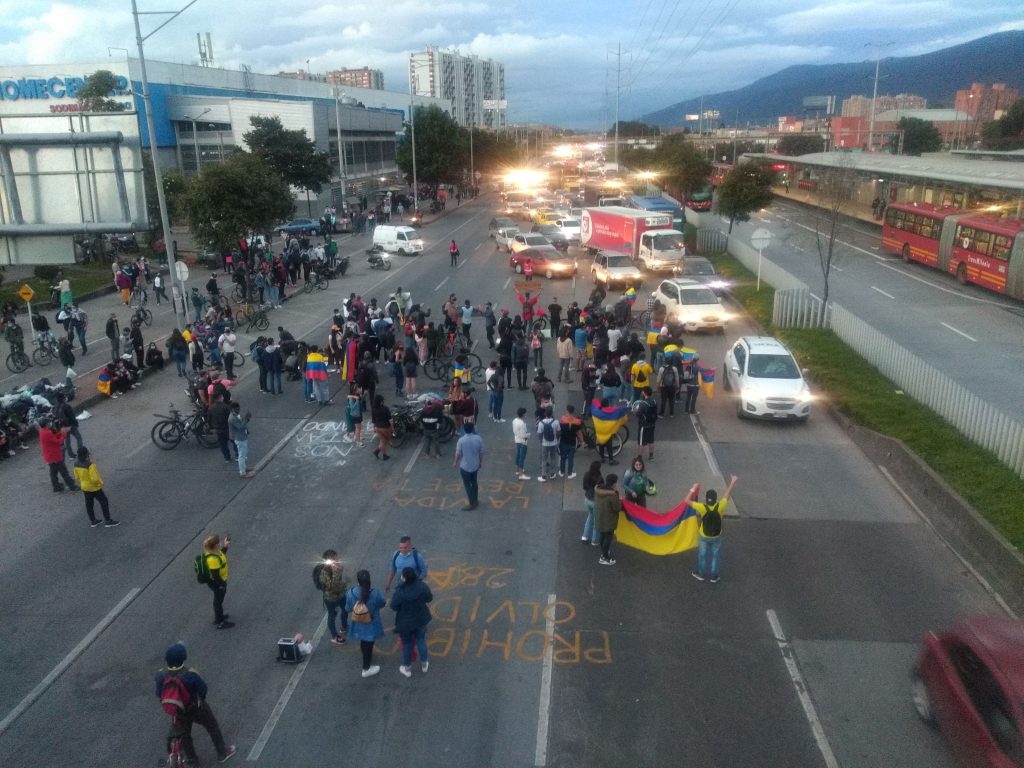Ingresa o regístrate acá para seguir este blog.
[Listen to an audio version of this blog entry here.]
The chaotic times Colombia is experiencing bring to mind just how inflexible a presidential system can be.
Back me or sack me
Faced with such a crisis in a parliamentary democracy, a motion of no confidence would most likely be tabled against the prime minister. If there was enough dissent in government ranks, the ruling party could lose such a vote. That would trigger, barring a new arrangement amongst the parties in parliament to choose a new premier, an election.
Either that or the prime minister, in a put-up-or-shut-up cry to the electorate, could call an election of his/her own accord. (In the Irish system, this would need to be signed off on by the largely ceremonial president, something that is normally just a matter of course.)
Think of Boris Johnson’s sweeping victory in the UK’s December 2019 general election. Having won the support of his party to take over as PM from Theresa May with a more hard-line Brexit position, he put it all on the line and went to the country in a bid to strengthen his mandate. It worked, quite stunningly. The many loud, influential voices against the Conservative leader had to grudgingly accept that the British electorate backed Boris.
Of the various demands from Colombia’s protesters, some are calling for the resignation of President Iván Duque. As I mentioned in my previous post, with an election for a new head of state just 12 months away, it’s unlikely in the extreme that this will happen.
However, I wonder if Duque right now wishes he was a prime minister in a parliamentary system where he could call a snap election. It would certainly put to the test the belief, particularly seen in international media, that the current protests are widely supported. (I must add, while Duque’s own popularity appears on the floor, his party, Centro Democrático, still has a solid support base. If we can call the Centro Democrático the party in power, the opposition is far from united — it’s quite a mixed bag.)
My take on it, from my humble estrato dos abode in the far north of Bogotá, is a little more nuanced.
Of course the many struggling to make ends meet want to see their lot improve. Don’t we all? The killing of innocent protesters by state forces is also wholly unacceptable. Most Colombians would appear to agree that some sort of police reform is badly needed.
However, as I’ve written oft-times before, the more radical, mostly younger forces that appear to make up the majority of the protesters aren’t exactly lovingly embraced by your average barrio-popular resident.
Unsurprisingly, there is a certain arrogance amongst the leftist, university-attending protesters towards those not of their ilk. ‘The uneducated idiots don’t know what’s good for them’ is a regular refrain.
‘Is it a case that the majority of Colombians feel they’re somewhere in the middle and relatively content with that?’
It’s a standard line of attack by those on the left. It rarely works. In fact, it’s often counterproductive.
Who are these “educated” folk to say that the construction worker or housecleaner doesn’t know what he/she wants?
Colombians don’t have to look too far to find an example of what can go horribly wrong when a country takes a hard turn to the left based on promises to end corruption and bring about a better life for all. Venezuela, anyone?
OK, some of you will say I’m being dramatic here. That what the protesters are really calling for is simply a fairer system, a reduction in inequality, not a version of Hugo Chávez Frías’ socialism for the 21st century.
The price of fairness
In terms of some of the standout demands on the protesters’ list — a guaranteed one month’s minimum wage for those officially living in poverty and no university tuition fees — it’s true that we’re not talking about unrealistic proposals when viewed from an international perspective. In fact, President Duque has already announced the introduction of free, temporary for the moment albeit, public higher education for students from the lowest three strata (for a brief introduction to the strata system, see https://wwcorrigan.blogspot.com/2014/10/end-of-strata-republic.html).
All such measures, to state the obvious, must be paid for somehow. In Ireland, my home country, a relatively generous social welfare system and “free” third-level education for undergraduates is financed by redistributing wealth through what one might call “progressive” taxes. There are always the complaints that the richest in society aren’t contributing enough and, on the other extreme, some people are just scrounging off the state.
Colombia, I’m guessing, would have to do something similar in terms of taxation. What might worry some who consider themselves to be just making ends meet, however, is that they would be asked to contribute more than they currently are to fund an expanded social welfare state. In other words, in a Colombian context, they’re not as poor as they think they are.
In a country where informal, unregulated employment and illegality — officially uncontrolled and outlawed by the state but unofficially approved — are commonplace and “suffice” for many involved in such activities, rocking the system is a risk they are reluctant to take.
It remains to be seen if the proposals to significantly expand Colombia’s welfare state make any real headway. By their very nature, they would require more government control in a country where there is much mistrust of state institutions. Colombia, do remember, tends to move to a conservative, raw-capitalist beat.
Without completely tearing down the house, in common with the social-democratic countries in Northern Europe, those looking for wholesale changes might find that a parliamentary system is the best vehicle to implement them.
They might also find, though, that they haven’t as much support as they may believe they have.
No system is perfect. Each one has its losers and winners. Is it a case that the majority of Colombians feel they’re somewhere in the middle and relatively content with that? On the other hand, there is the nothing-ventured-nothing-gained argument. Deciphering the amount of change needed, or not as the case may be, is a delicate balance.
Future elections, the candidates that go forward and the manifestos they present will give us some indication of where ‘el pueblo colombiano’ stands on all this.
_______________________________________________________________
Listen to Wrong Way’s Colombia Cast podcast here.
Facebook: Wrong Way Corrigan — The Blog & IQuiz “The Bogotá Pub Quiz”.


